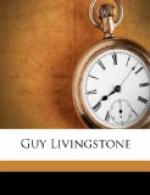“What! the girl you sent away about three weeks ago?” some one asked. “Poor thing! she was not sorry, I should think. She had a hard time of it before she left you.”
“Precisely,” Levinge replied. “Her modesty and high moral principles, which I never could quite subdue, gave a zest to the thing at first. You understand?—a sort of caviare flavor. But at last it bored me horribly. I really believe she had a conscience. Can you conceive any thing so out of place? I did offer her a little money when she went away, but she would not take any, and said she would try to maintain herself honestly. Bah! I defy her. She was a governess, you know, when I took her first, so she is trying some of the old accomplishments. I wish you joy of your protegee, Livingstone; and as for her address, if any of you want it, I will give it you to-morrow.”
Before Guy could reply Mohun broke in. While Levinge had been speaking, the colonel’s face had grown very dark and threatening.
“Did her father live near Walmer? And was he a half-pay officer?”
“Quite correct,” was the answer. “He died about eighteen months before I met Fanny. You knew him, perhaps? How interesting! Excuse my emotion.”
“I did know him,” Ralph said. “He was a gentleman, and well born. Perhaps that was the reason you could not get on long with his daughter?”
It is a popular error that a bully is always a coward. Certainly Horace was an exception to the rule, if such exists. Nothing could be more calmly insolent than his tone as he answered deliberately,
“How admirable to find Colonel Mohun in the character of the Censor! A Clodius come to judgment. I should hardly have expected it, from his past life, either.”
The reply came from the depths of Ralph’s chest, very distinct, but with a strange effect of distance and echo, as if the words had been spoken under the vault of some vast dome.
“You will leave my past life alone, if you are wise. I don’t preach against immorality; it is only brutality that I find simply disgusting.”
“Bah!” the other retorted; “it comes to the same thing. I should have thought Lady Caroline Mannering might have taught you to be less critical.”
The Cuirassier rose from his seat and strode a pace forward, the gray hair bristling round his savage face like a wild-boar’s at bay.
“If you dare to breathe that name again, except with respect and honor, I’ll cram the words down your throat, by the eternal God!”
Levinge crimsoned with passion. The brutal blood of the dead prize-fighter, who, when he “crossed” a fight, lost it ever by a foul blow, was boiling in his descendant. He had been drinking too, and, as the French say—avait le vin mauvais—so he answered coolly and slowly, letting the syllables fall one by one, like drops of hail,
“I shall mention it just as often as it pleases me, and with just so much respect as is due to Mannering’s cast-off wife and your—”




